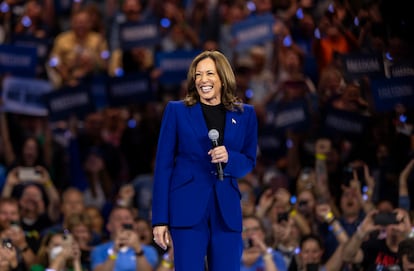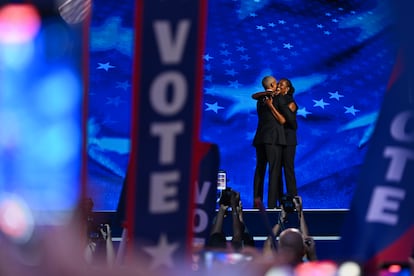Kamala Harris restores Democratic faith in a November victory
The vice president will give the most important speech of her political career Thursday, in which she will accept the presidential nomination from a party that is enthusiastic and has united against all odds around her candidacy

An hour and a half’s drive, depending on traffic, separates Milwaukee, Wisconsin, from Chicago, Illinois. In chronological terms in the most dislocated presidential campaign in recent U.S. history, that distance is 34 days; those that have passed between Donald Trump’s acceptance speech as candidate on last day of the Republican National Convention, and the one that Vice President Kamala Harris will offer Thursday at the Democratic conclave to seal her ascendancy as leader of a party that, thanks to her, has regained faith in a victory in November.
A gulf that is not only ideological also separates the two speeches. In the Milwaukee perspective, it seemed that nothing would stand in the way of Trump returning to the White House. The Republican candidate had just survived an assassination attempt and presented himself as a new man, sparking a fresh injection of popularity. In another demonstration that nothing should be taken for granted in American politics, Harris is about to give the most important speech of her career on the wave of something that seemed impossible when the Republican Party conclave was being held: the undisguised enthusiasm of her supporters, indications that women and minorities may be propelling her on her way to the White House, and the unity, forged in record time, of the Democrats around an unlikely candidate who almost everyone distrusted not so long ago.
What the Chicago convention would have been like if President Joe Biden had not withdrawn from the race is a now a question entertaining fans of political fiction. The remainder are left with the certainty that at the end of June, this was a party demoralized by the prospect of a candidate sleepwalking toward a disaster at the polls while resurrecting memories of the 1968 convention, the most turbulent in the last half century for Democrats. Against a backdrop of protests over the Vietnam War, that gathering, in which the party was broken in two, produced a disappointing candidate in Hubert Humphrey who was roundly beaten to the White House by Richard Nixon.
No one expected that in the corridors of the Bulls stadium, where the Democratic convention is being held, the memory that prevails after two days of triumphant speeches would be that of the 2008 convention. And it is not only because the Obamas, who began the final stretch of their journey to the White House then, stole the show Tuesday with speeches that confirmed that they are still the party’s best orators; nor because another survivor of those heroic times, the artist Shepard Fairey, has decided to lend a hand by adapting Harris’ face to the iconic three-color poster he created for that occasion with the image of Barack Obama and the word Hope, which he has substituted with another: Forward.
#KamalaHarrisForward I believe VP Kamala Harris and her VP pick Tim Walz are our best chance to move forward. They are our best chance to push back on encroaching fascism and threats to democracy, and our best chance for creating the world we all desire and deserve. Politics is… pic.twitter.com/8tTuLfIbEw
— Shepard Fairey (@OBEYGIANT) August 15, 2024
“Personally, I feel something very similar to what I felt 16 years ago: it is the feeling that a movement is being generated around the candidate,” said strategist Juan Verde in an interview on Wednesday. He has not missed a convention since 1992 and has worked on all Democratic presidential campaigns since Bill Clinton, including this one. “However,” he added, “there is a fundamental difference: she has achieved it in record time — just over a month — when Obama had almost a year.”
Those few weeks were also enough, Verde notes, to pacify a coalition that threatened to slide into civil war if Biden stepping down had given way to an open convention. Quite the opposite: there was no trace in Chicago of the behind-the-scenes battles that Bernie Sanders’ delegates waged in 2016, nor the symbolic gesture of Alexandria Ocasio-Cortez in 2020, when she spoke for just 90 seconds to express her disagreement with Biden’s appointment. Both Sanders and Ocasio-Cortez were among the stars on the speakers’ platform over the first two days at the United Center.
“This shows that the Democratic coalition has many important leaders and not just one, as is the case with the Republican Party with Trump, or at most a group of people who think like him and are like him,” said former ambassador to Spain Julissa Reynoso, who worked as Jill Biden’s chief of staff and has joined Harris’ campaign. “Ours is a machine with a great capacity for mobilization that knows how to pull in one direction. I know Biden well and I know that he is a man who does things very carefully, and that when he handed over the baton to his vice president, he was well aware of her ability to unify the party.”
Biden may have had it all figured out but from the Milwaukee perspective, that didn’t seem such an easy fix either. Perhaps that’s why Harris and Minnesota Governor Tim Walz, her vice-presidential candidate, traveled Tuesday to the stadium where Trump was nominated as his party’s candidate in the most populous city in Wisconsin — a state that will once again be decisive at the polls — to stage a rally with two objectives: to reconquer that space and that city, and to show that attendance at Democratic rallies (18,000, according to the campaign) is reaching numbers that were unthinkable just two months ago when Biden was leading the charge.

On Tuesday, a crowd gathered outside the stadium in Milwaukee five hours before the vice president took the microphone. From conversations with about 20 people, the following pattern emerged: women and those new to attending a political rally predominated. T-shirts with messages like “Proud Lady with Cats and No Kids,” a reference to Republican vice-presidential candidate J. D. Vance’s comments on women who choose not to have children, or “The Prosecutor Against the Criminal,” a reference to Harris’ campaign message recalling her past as a lawyer and her rival’s status as a convicted felon, were also prevalent.
That served to certify the extension of another strategy of this new Democratic Party: after years in which it was the Republicans who mocked their opponents and gave off the image of having a monopoly on fun at the expense of the opposition, the Democratic campaign has gone on the attack on social networks, in electoral merchandising, and even in convention speeches.
“The world has changed a lot since the last election, which the Republicans baselessly claimed had been stolen from them,” recalls Verde. “In the empire of fake news and half-truths, we can no longer expect voters, and even less so young people, to reflect calmly on proposals or to have the ability to contrast information. That is why — and always without lowering themselves to the same level — the campaign has sharpened its messages around two slogans, ‘Forward’ and ‘When we fight, we win’, and a single idea: to look to the future, while the Republicans remain obsessed with the past.”
Overconfidence
These days, in both Midwestern cities, it is easy to get carried away with the impression that this enthusiastic message could work for the Democrats, although it’s also worth remembering that the conventions of the two major parties in the United States are huge machines for generating and selling positive emotions. It’s also possible that all this is, as the other side claims, the enormous sleight of hand of a friendly media (such as CNN, in whose broadcasts from Chicago this week jubilation has been overflowing).
To avoid the unwanted effect of excessive confidence, both Harris and Walz warned those who take victory for granted in their speeches at Tuesday’s rally that there is still much to do in the two and a half months remaining until the elections. To begin with, they must trumpet the true personality and electoral proposals of the unexpected candidate beyond the elites of Washington and the West Coast and the devoted hosts of Hollywood. The speech Harris is preparing to deliver Thursday in Chicago, the most important of her political life, will be fundamental to achieving this objective.
Sign up for our weekly newsletter to get more English-language news coverage from EL PAÍS USA Edition
Tu suscripción se está usando en otro dispositivo
¿Quieres añadir otro usuario a tu suscripción?
Si continúas leyendo en este dispositivo, no se podrá leer en el otro.
FlechaTu suscripción se está usando en otro dispositivo y solo puedes acceder a EL PAÍS desde un dispositivo a la vez.
Si quieres compartir tu cuenta, cambia tu suscripción a la modalidad Premium, así podrás añadir otro usuario. Cada uno accederá con su propia cuenta de email, lo que os permitirá personalizar vuestra experiencia en EL PAÍS.
¿Tienes una suscripción de empresa? Accede aquí para contratar más cuentas.
En el caso de no saber quién está usando tu cuenta, te recomendamos cambiar tu contraseña aquí.
Si decides continuar compartiendo tu cuenta, este mensaje se mostrará en tu dispositivo y en el de la otra persona que está usando tu cuenta de forma indefinida, afectando a tu experiencia de lectura. Puedes consultar aquí los términos y condiciones de la suscripción digital.









































